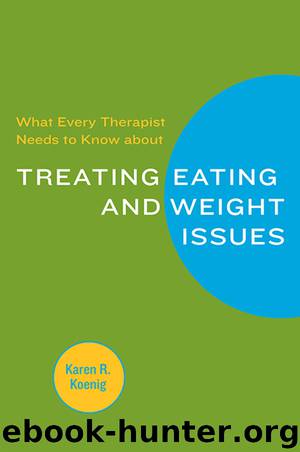What Every Therapist Needs to Know about Treating Eating and Weight Issues by Karen R. Koenig

Author:Karen R. Koenig
Language: eng
Format: epub
Publisher: W. W. Norton & Company
1. Do you ever minimize, deny, or rationalize food and body problems?
2. Do you see your body as others do?
3. Are there any traumatic events in your history that might cause you to feel uncomfortable about your body?
4. How do you take care of yourself physically, emotionally, mentally, and spiritually?
Another area in which food and weight issues arise is intimate and sexual relationships. Clients may become anxious about looking so attractive that they will be hit on, fearing that, given half a chance, they will become highly sexual. Putting on weight may also be a way to distance themselves from their partner, to reject them, or to get back at them for real or imagined slights. Clients may end up putting on weight to prevent them from acting on a desire to end a relationship—if they are fat, who will want them except their partner? Weight gain becomes a way of maintaining the status quo.
When couples are having difficulties, one may get back at the other by either criticizing their partner’s weight or eating habits or by undermining her efforts to get to or maintain a healthy weight. It is helpful to listen for these kinds of comments, even when clients say they are in a wonderful, satisfying relationship. Shaming someone about eating and weight is a form of verbal/emotional abuse and is meant to control a partner. In turn, this partner may be acting out with food passive-aggressively. Overweight or even average weight clients also may be preoccupied with slimness if their partner loses a great deal of weight. They may fear that he will abandon them for someone else or be interested in seeing who is available in the dating world. They may go on a crash diet to lose weight to hold on to a partner’s affections or be so angry or frightened that they let themselves go so that they will have something on which to blame their anticipated abandonment.
When working with adolescents and young adults who are about to separate from or have recently moved out of a parent’s home, it is useful to wonder about the possibility of eating problems. I say eating problems rather than a full-blown disorder because it is common in times of transition for people to eat a little more or less than usual. Maybe young adults are going off to college or for a year abroad or perhaps they are getting their first apartment on their own. Sometimes situational depression, sadness, and longing for home cause loss of appetite. Other times food, especially what Mom or Dad used to make, becomes the best comfort in the world. If a client is buying food for herself for the first time, she may feel a need to break out and try new delights, especially if parental rules about eating were strict. On the other hand, she may purposely restrict food intake in reaction to a family that overfed her and made her eat everything on her plate. Or her parents may have been in charge of feeding her and she may not know how to shop or cook for herself.
Download
This site does not store any files on its server. We only index and link to content provided by other sites. Please contact the content providers to delete copyright contents if any and email us, we'll remove relevant links or contents immediately.
The Plant Paradox by Dr. Steven R. Gundry M.D(2620)
Heartstopper Volume 3 by Alice Oseman(2202)
Beauty Sick by Renee Engeln PhD(1844)
50 Ways to Soothe Yourself Without Food by Susan Albers(1792)
Mindful Eating by Jan Chozen Bays(1575)
Just Three Words (Soho Loft #2) by Melissa Brayden(1554)
Skin by Unknown(1422)
The Golden Cage by Camilla Läckberg(1414)
Brave Girl Eating by Harriet Brown(1348)
The Archetype Diet by Dana James & Mark Hyman(1306)
Women Food and God: An Unexpected Path to Almost Everything by Roth Geneen(1271)
A Memoir of Anorexia and Bulimia by Wasted(1222)
Wasted Updated Edition by Marya Hornbacher(1209)
Brave Girl Eating: A Family's Struggle With Anorexia by Harriet Brown(1207)
Hungry by Sheila Himmel(1187)
Big Girl: How I Gave Up Dieting and Got a Life by Kelsey Miller(1172)
Mothers, Daughters, and Body Image by Hillary L. McBride(1163)
My Secret Life by Leanne Waters(1162)
Unbearable Lightness: A Story of Loss and Gain by Rossi Portia de(1158)
